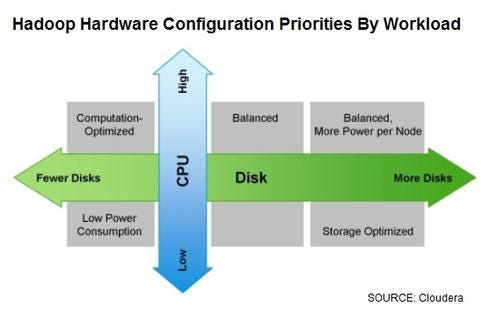Rackspace On The Block?Rackspace On The Block?
Facing cloud price war and tough competition, Rackspace weighs options including partner or buyer, according to SEC filing.


10 Hadoop Hardware Leaders
10 Hadoop Hardware Leaders (Click image for larger view and slideshow.)
Rackspace, confronting a grinding competition to supply infrastructure as a service, has hired Morgan Stanley to advise it on whether the company should enter an exclusive partnership or sell itself to one of the parties that has expressed interest in buying the San Antonio company.
The move makes it more likely that Rackspace will be acquired by a company that is ambitious to quickly build its cloud market share. That might be IBM's SoftLayer unit, CenturyLink Savvis, or Verizon Terremark, all of whom share some of Rackspace's managed hosting service background. Microsoft also might be looking at Rackspace, although Microsoft would be hampered by the preponderance of Linux workloads in the Rackspace Cloud.
"In recent months, Rackspace has been approached by multiple parties who have expressed interest in a strategic relationship with Rackspace, ranging from partnership to acquisition," the company said in an 8K statement filed with the Securities Exchange Commission May 16.
"Our board decided to hire Morgan Stanley to evaluate the inbound strategic proposals, and to explore any other alternatives which could advance Rackspace's long-term strategy," the statement said.
[Want to learn more about how cloud prices are dropping? See Microsoft Battles Google, Amazon In Cloud Price War.
The company took the step after reporting first quarter results on May 12 that were stronger than expected. It pulled in $421 million in first quarter revenue, beating expectations that it could do no better than $419 million. It was a 16% increase over the same quarter the year before. The company's $25 million in net income resulted in earnings per share of 18 cents, a penny below last year's but 6 cents above analysts' estimates of 12 cents per share. It probably decided to move while it was still in a position of perceived financial strength.
Nor does the Morgan Stanley link mean it's automatically putting itself on the block. "No decision has been made and there can be no assurance that the Board's review process will result in any partnership or transaction being entered into or consummated. The company has not set a timetable for completion of this process and does not intend to discuss or disclose further developments with respect to this process unless and until the Board approves a specific partnership or transaction," the filing said.
Nevertheless, Rackspace, a company founded to set up infrastructure and run it as outsourcers for other parties, is caught in the middle of a rapidly changing cloud landscape. It co-founded the OpenStack project with NASA, took over leadership as NASA withdrew, then successfully navigated the turnover of the project to the OpenStack Foundation. But as the open-source cloud software matures, that makes it harder to Rackspace to stand out from the crowd. One of its early advantages was OpenStack expertise, and now that expertise is spreading throughout a wider community.
It sought to differentiate itself in the early days as the cloud with technical support -- "fanatical support," it called it. But many of the cloud's early users were technically skilled people who were looking for a low cost, flexible platform on which to do development and run applications by remote control. And the most competitive cloud providers have driven prices down relentlessly.
Google stepped in with cuts averaging 32% on virtual instances March 25, with a 68% drop in Google Cloud Storage. Amazon Web Services followed March 26 with a 38% cut on its most popular server instance and a 51% cut in storage prices. A few days later, Microsoft followed suit.
In a realm where prices drop out of the sky, where is Rackspace to play? It is transitioning its business from managed hosting into public infrastructure as a service. The transition is going well, overall, but the move leaves it with a set of consulting and integration skills available to the cloud computing side of its business for which it must charge, and Wall Street analysts, witnessing the cut-throat price cuts, have been pessimistic it will find a way to do so.
Jillian Mirandi, an analyst at Technology Business Research, wrote on the day of Rackspace's earnings announcement that the company was caught in between the bare bones infrastructure providers price cuts and the outsourcing, legacy system integrating capabilities of the new arrivals in the cloud. They would be IBM, HP, Cisco, and Accenture, among others.
With "AWS, Google and Microsoft Azure coming in from the more traditional, cheap cloud compute and storage side, Rackspace faces increasing competition from all sides," she wrote. Rackspace has OpenStack and hybrid cloud operations expertise, but "hybrid cloud capabilities and OpenStack support are quickly becoming table stakes, and a direct or partner-led managed services layer is not far behind."
Rackspace also has experience in combining development and operations -- DevOps, in a word -- as it's made its transition into cloud that it's willing to share with customers. Other providers have not ventured there.
Rackspace brings an interesting blend of assets to cloud computing. Its 8K filing signals a decision within the company to test the waters and see what is the best deal it can strike, while earnings are still respectable and its perceived value is strong. And if no deal is struck, as the filing indicated might be possible, then more people outside of Rackspace will wonder how it's going to proceed further down its rocky path.
Can the trendy tech strategy of DevOps really bring peace between developers and IT operations -- and deliver faster, more reliable app creation and delivery? Also in the DevOps Challenge issue of information: Execs charting digital business strategies can't afford to take Internet connectivity for granted.
About the Author
You May Also Like






